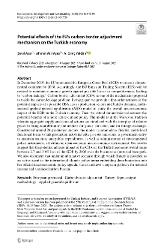| dc.contributor.author | Acar, Sevil | |
| dc.contributor.author | Asici, Ahmet Atil | |
| dc.contributor.author | Yeldan, A. Erinc | |
| dc.date.accessioned | 2023-10-19T15:12:37Z | |
| dc.date.available | 2023-10-19T15:12:37Z | |
| dc.date.issued | 2022 | |
| dc.identifier.issn | 1387-585X | |
| dc.identifier.issn | 1573-2975 | |
| dc.identifier.uri | https://doi.org/10.1007/s10668-021-01779-1 | |
| dc.identifier.uri | https://hdl.handle.net/20.500.12469/5493 | |
| dc.description.abstract | In December 2019, the EU announced the European Green Deal (EGD) to create a climate-neutral continent by 2050. Accordingly, the EU Emission Trading System (ETS) will be revised to maintain economic growth against possible losses in competitiveness, leading to carbon leakage. Carbon border adjustment (CBA) is one of the mechanisms proposed to tackle the carbon leakage problem. In this paper, we provide a first-order estimate of the potential impacts of a possible CBA across production sectors and build a dynamic, multi-sectoral applied general equilibrium (AGE) model to study the overall macroeconomic impact of the EGD on the Turkish economy. Then, we extend our analysis to document the potential benefits of a more active climate policy. The model is in the Walrasian tradition wherein aggregate supply and demand actions are simulated with the interplay of relative prices to bring equilibrium in the markets for goods, for labor, and for foreign exchange. Constructed around 24 production sectors, the model accommodates flexible, multi-level functional forms to link production activities with gaseous emissions, a government entity to maintain taxation, and public expenditures, as well as administration of environmental policy instruments, all within an open-economy macroeconomic environment. Our results suggest that the potential adverse impact of the CBA on the Turkish economy would range between 2.7 and 3.6% loss of the GDP by 2030 over the business-as-(un)usual base path. We also document that under an alternative scenario through which Turkey is modeled as an active agent in the international climate policy arena embedding decarbonization into her official macroeconomic policy agenda, she can achieve a superior pathway for national income and a reduced carbon burden. | en_US |
| dc.language.iso | eng | en_US |
| dc.publisher | Springer | en_US |
| dc.relation.ispartof | Environment Development and Sustainability | en_US |
| dc.rights | info:eu-repo/semantics/openAccess | en_US |
| dc.subject | Growth | En_Us |
| dc.subject | European green deal | en_US |
| dc.subject | Carbon border adjustment | en_US |
| dc.subject | Turkey | en_US |
| dc.subject | Input-output methodology | en_US |
| dc.subject | Applied general equilibrium | en_US |
| dc.title | Potential effects of the EU's carbon border adjustment mechanism on the Turkish economy | en_US |
| dc.type | article | en_US |
| dc.identifier.startpage | 8162 | en_US |
| dc.identifier.endpage | 8194 | en_US |
| dc.authorid | Yeldan, A Erinc/0000-0002-3123-4374 | |
| dc.authorid | Acar, Sevil/0000-0001-5535-8673 | |
| dc.authorid | Acar, Sevil/0000-0001-5535-8673 | |
| dc.authorid | Asici, Ahmet Atil/0000-0002-5067-6143 | |
| dc.identifier.issue | 6 | en_US |
| dc.identifier.volume | 24 | en_US |
| dc.department | N/A | en_US |
| dc.identifier.wos | WOS:000691629800005 | en_US |
| dc.identifier.doi | 10.1007/s10668-021-01779-1 | en_US |
| dc.identifier.scopus | 2-s2.0-85113940990 | en_US |
| dc.institutionauthor | N/A | |
| dc.relation.publicationcategory | Makale - Uluslararası Hakemli Dergi - Kurum Öğretim Elemanı | en_US |
| dc.authorwosid | Yeldan, A Erinc/AAA-4707-2022 | |
| dc.authorwosid | Acar, Sevil/AAM-4824-2021 | |
| dc.authorwosid | Acar, Sevil/N-7478-2017 | |
| dc.authorwosid | Asici, Ahmet Atil/C-6612-2013 | |
| dc.identifier.pmid | 34483717 | en_US |
| dc.khas | 20231019-WoS | en_US |
















